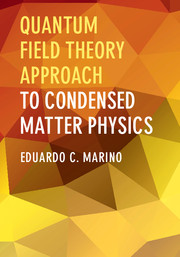Book contents
- Frontmatter
- Dedication
- Contents
- Preface
- Part I Condensed Matter Physics
- Part II Quantum Field Theory
- Part III Quantum Field Theory Approach to Condensed Matter Systems
- 13 Quantum Field Theory Methods in Condensed Matter
- 14 Metals, Fermi Liquids, Mott and Anderson Insulators
- 15 The Dynamics of Polarons
- 16 Polyacetylene
- 17 The Kondo Effect
- 18 Quantum Magnets in 1D: Fermionization, Bosonization, Coulomb Gases and “All That”
- 19 Quantum Magnets in 2D: Nonlinear Sigma Model, CP1 and “All That”
- 20 The Spin-Fermion System: a Quantum Field Theory Approach
- 21 The Spin Glass
- 22 Quantum Field Theory Approach to Superfluidity
- 23 Quantum Field Theory Approach to Superconductivity
- 24 The Cuprate High-Temperature Superconductors
- 25 The Pnictides: Iron-Based Superconductors
- 26 The Quantum Hall Effect
- 27 Graphene
- 28 Silicene and Transition Metal Dichalcogenides
- 29 Topological Insulators
- 30 Non-Abelian Statistics and Quantum Computation
- Further Reading
- References
- Index
30 - Non-Abelian Statistics and Quantum Computation
from Part III - Quantum Field Theory Approach to Condensed Matter Systems
Published online by Cambridge University Press: 25 October 2017
- Frontmatter
- Dedication
- Contents
- Preface
- Part I Condensed Matter Physics
- Part II Quantum Field Theory
- Part III Quantum Field Theory Approach to Condensed Matter Systems
- 13 Quantum Field Theory Methods in Condensed Matter
- 14 Metals, Fermi Liquids, Mott and Anderson Insulators
- 15 The Dynamics of Polarons
- 16 Polyacetylene
- 17 The Kondo Effect
- 18 Quantum Magnets in 1D: Fermionization, Bosonization, Coulomb Gases and “All That”
- 19 Quantum Magnets in 2D: Nonlinear Sigma Model, CP1 and “All That”
- 20 The Spin-Fermion System: a Quantum Field Theory Approach
- 21 The Spin Glass
- 22 Quantum Field Theory Approach to Superfluidity
- 23 Quantum Field Theory Approach to Superconductivity
- 24 The Cuprate High-Temperature Superconductors
- 25 The Pnictides: Iron-Based Superconductors
- 26 The Quantum Hall Effect
- 27 Graphene
- 28 Silicene and Transition Metal Dichalcogenides
- 29 Topological Insulators
- 30 Non-Abelian Statistics and Quantum Computation
- Further Reading
- References
- Index
Summary
Classical computation is based on algorithms that manipulate binary variables (bits), which convey the information being processed. Such algorithms are formed by logic units (logic gates), which are basic functions of binary variables yielding an output that will be used in the next step of the algorithm, and so on. Algorithms of classical computation make extensive use of irreversible gates, which can only be used in one direction and, consequently, loose information. Quantum computation, conversely, uses the quantum states of a given Hilbert space (qubits) to store the information [290, 291, 292]. Then, it takes advantage of the fact that these states have a unitary evolution to build data-processing algorithms, which only possess reversible, unitary logic gates. An important point in this scheme is that coherence of the quantum states storing the information is a crucial requirement; otherwise, the information is lost. Nevertheless, we know that quantum systems rapidly loose their coherence as we increase their size. A clever method of coherence protection, therefore, must be devised if we want to have a quantum computer operating on a human scale. For this reason, quantum computation, since its inception, has been always related to the principles of quantum mechanics.
The main method of coherence protection involves excitations having the so-called non-abelian statistics. Such excitations were shown to occur in the ν = 5/2 plateaus of systems presenting the quantum Hall effect, which is described by the Moore–Read Pfaffian wave-function. Such a state is associated to a Landau–Ginzburg type field theory consisting in the level 2 non-abelian SU(2) Chern–Simons theory in the same way the odd denominator plateaus described by the Laughlin wave-function are associated to the Zhang–Hansson–Kivelson abelian Chern–Simons–Landau–Ginzburg theory. We have shown that the vortex excitations of this theory correspond to the (abelian) anyon excitations of Laughlis's wave-function. In an analogous way, the vortex excitations of the non-abelian Chern–Simons theory are associated to the Pfaffian wave-function excitations, which present non-abelian statistics. Such gapped bulk excitations produce gapless Dirac excitations on the edges, which may combine in specific ways to reproduce the non-abelian statistics exhibited by the bulk vortex states.
- Type
- Chapter
- Information
- Quantum Field Theory Approach to Condensed Matter Physics , pp. 478 - 500Publisher: Cambridge University PressPrint publication year: 2017



